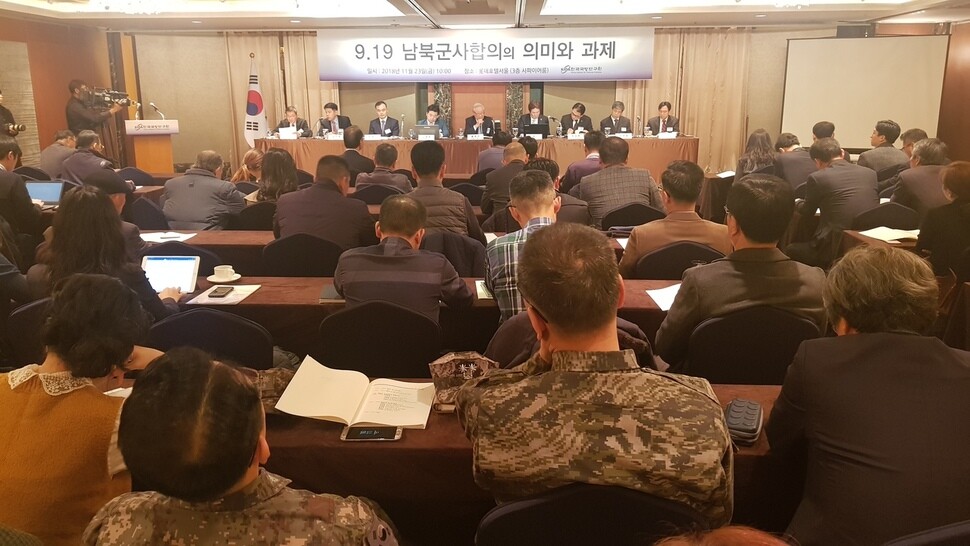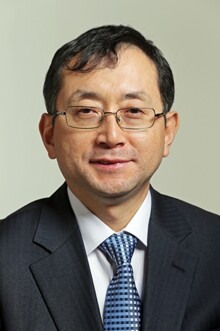hankyoreh
Links to other country sites 다른 나라 사이트 링크
[Column] Moon’s plummeting approval ratings and the conservatives’ counterattack

From a height of over 80% at one time, President Moon Jae-in’s approval rating has dipped to just above 50%. Now that the “eradication of deep-rooted vices” has entered its final stages and North Korean nuclear negotiations have failed to progress, he finds himself hampered in the economic domain – particularly with his much-derided “income-driven growth.” With even the Blue House confessing it had no idea the minimum wage would rise by fully 16%, the prior preparations were inevitably inadequate.
Adding to the negative impact is the plan for two straight years of budget cuts amid predictions of shrinking domestic demand. Factor in the conflict between Minister of Economy and Finance Kim Dong-yeon and Blue House Chief Policy Advisor Jang Ha-sung, and the possibility of an economic rebound was virtually nil. It’s the kind of mistake for which no excuses can be made.
But it’s also true that there’s no real way out besides income-driven growth. The growth approach that depends on “trickle-down effects” from exports and large corporations has hit a wall. Both the ILO and OECD are proposing wage-driven or inclusive growth, while Japanese Prime Minister Shinzo Abe and Chinese President Xi Jinping are pushing measures to raise wages and stoke domestic demand.
In terms of the Moon administrations’ faults, the decisive one appears to have to been its failure to anticipate the ramifications of the economic paradigm shift it proposed. Economic indicators during the 10 years of the Kim Dae-jung and Roh Moo-hyun administrations weren’t any worse than under the Lee Myung-bak or Park Geun-hye presidencies, yet Roh in particular was singled out for harsh attacks throughout his term from a conservative/reactionary press and parties, who accused him of being a “President who abandoned the economy,” condemning it to a “tax bomb” and “economic catastrophe.”
Kim Dae-jung similarly faced an onslaught of “economic crisis” accusations, which appealed to regional sentiments with claims of “no Chuseok this year for Daegu or Busan.” Among the three pillars of the “Moon economy,” his “fair economy” vision involved putting a stop to improper transactions by major corporations, which had taken advantage of a predatory subcontracting structure to drive down unit prices and monopolized profits through the appropriation of technology. But the people in the administration took all too light a view of South Korea’s established groups, which have established firmly entrenched interests over decades of a large corporation-centered economic social structure. Sure enough, those same groups came swarming like bees as soon as they saw a potential weakness with the too-sudden minimum wage hike. The accusations included “treating the public like experimental subjects,” and even claims of a “socialist economy.” First, Moon began meeting one-on-one with chaebol heads whose trials were still under way; then the Deputy Prime Minister for the Economy was seen apparently begging for “innovation growth.” Soon enough, the administration was touting “inclusive growth” instead of income-driven growth.
It’s a troubling spectacle that suggests they have lost the battle of discourse.
The reemergence of voices of conservative extremists
As the Moon administration entered its second year, the people who had been cowed before by candlelight demonstrations and vice eradication campaigns began making their voices heard.
The court influence-peddling scandal is a judicial version of the vices that built up under the Park administration. The seeds were planted with appellate court transactions between Park’s Blue House and the Supreme Court under Chief Justice Yang Sung-tae. The only way to even begin restoring the public’s trust would be to hold everyone responsible fully accountable and overhaul the system. Instead, the senior judicial officials and other vested interests in and around the course have misplaced their priorities and gone after the current chief justice, insisting he explain why he called for an investigation by prosecutors.
With clear evidence surfacing of trial interference and monitoring of judges, a national conference of judges’ representatives voted on a message of reflection calling for the “consideration of impeachment.” Far from being cheered on, the conference has been blasted as a “clique” that should be “disbanded.” As current Chief Justice Kim Myeong-soo continues watching for cues, signs now point to backtracking even on the judicial administration reform plan that the judicial advancement committee managed to produce. With calls emerging at the Taegukgi Rallies (far-right activists) to “take issue” with Park Geun-hye’s criminal punishment, it’s enough to leave one worried that people will start lobbing Molotov cocktails at the courts working on the vice eradication effort.
The same people are also openly going after the North Korea nuclear talks. No sooner had the South and North Korean leaders reached their agreement in Singapore than they began voicing views that were deeply out of step with popular sentiments – calling the event the “Republic of Korea deception reality show” and claiming that it would have been “possible to end North Korea’s nuclear program in the 1990s if the South Korean public had acted more impetuously when the US was considering a bombing attack.”
After joint military exercises with the US were suspended, they began voicing premature concerns that it could “mark the beginning of the US military’s withdrawal.” When South and North Korea came out with a military agreement virtually on par with a declaration ending the Korean War, they terrified the public with claims that the “defensive wall around Seoul is crashing down.” More recently, they have been uncritically quoting exaggerated US press reports using old satellite photos as a basis for claiming a “great deception” by North Korea – far from trying to set the record straight, they have derided the Blue House as “North Korea’s mouthpiece” when it tried to explain the situation. It’s quite a striking turnaround from the unrealistically rosy predictions of a unification “jackpot” made early in the Park administration, when there were no signs of a resolution to the North Korean nuclear issue on the horizon. This smacks of political aims that go beyond the level of distrust toward North Korea.
Will Moon administration answer hopes of candlelit demonstrations?
The “candlelight declaration of rights” pronounced last year after Park’s impeachment vowed that said impeachment was “not the end,” declaring plans to “change the very places where we live and work so that democracy does not crumble again.”

Having emerged out of those candle flames, it now looks to be in question whether the Moon administration will answer those hopes. The re-emergence of conflicts between the labor world and the government gives a sense of déjà vu that recalls the early days of the Roh administration. With an allied establishment forming such a formidable barrier, it’s impossible to shake the fear that we will see the same sort of reversal witnessed after the April Revolution in 1960, the Seoul Spring of 1980, and the June Democracy Struggle of 1987. Needless to say, the people who should feel most responsible and concerned are the ones in the Blue House.
By Kim Ri-taek, editorial writer
Please direct comments or questions to [english@hani.co.kr]

Editorial・opinion
![[Column] Season 2 of special prosecutor probe may be coming to Korea soon [Column] Season 2 of special prosecutor probe may be coming to Korea soon](https://flexible.img.hani.co.kr/flexible/normal/500/300/imgdb/original/2024/0426/3317141030699447.jpg) [Column] Season 2 of special prosecutor probe may be coming to Korea soon
[Column] Season 2 of special prosecutor probe may be coming to Korea soon![[Column] Park Geun-hye déjà vu in Yoon Suk-yeol [Column] Park Geun-hye déjà vu in Yoon Suk-yeol](https://flexible.img.hani.co.kr/flexible/normal/500/300/imgdb/original/2024/0424/651713945113788.jpg) [Column] Park Geun-hye déjà vu in Yoon Suk-yeol
[Column] Park Geun-hye déjà vu in Yoon Suk-yeol- [Editorial] New weight of N. Korea’s nuclear threats makes dialogue all the more urgent
- [Guest essay] The real reason Korea’s new right wants to dub Rhee a founding father
- [Column] ‘Choson’: Is it time we start referring to N. Korea in its own terms?
- [Editorial] Japan’s rewriting of history with Korea has gone too far
- [Column] The president’s questionable capacity for dialogue
- [Column] Are chaebol firms just pizza pies for families to divvy up as they please?
- [Column] Has Korea, too, crossed the Rubicon on China?
- [Correspondent’s column] In Japan’s alliance with US, echoes of its past alliances with UK
Most viewed articles
- 1[Column] Season 2 of special prosecutor probe may be coming to Korea soon
- 2‘We must say no’: Seoul defense chief on Korean, USFK involvement in hypothetical Taiwan crisis
- 3Is N. Korea threatening to test nukes in response to possible new US-led sanctions body?
- 4Division commander ordered troops to enter raging flood waters before Marine died, survivor says
- 5Is Japan about to snatch control of Line messenger from Korea’s Naver?
- 6No good, very bad game for Korea puts it out of Olympics for first time since 1988
- 7[Editorial] Korea’s surprise Q1 growth requires objective assessment, not blind fanfare
- 8Korea’s 1.3% growth in Q1 signals ‘textbook’ return to growth, says government
- 9N. Korean delegation’s trip to Iran shows how Pyongyang is leveraging ties with Moscow
- 10Amnesty notes ‘erosion’ of freedom of expression in Korea in annual human rights report